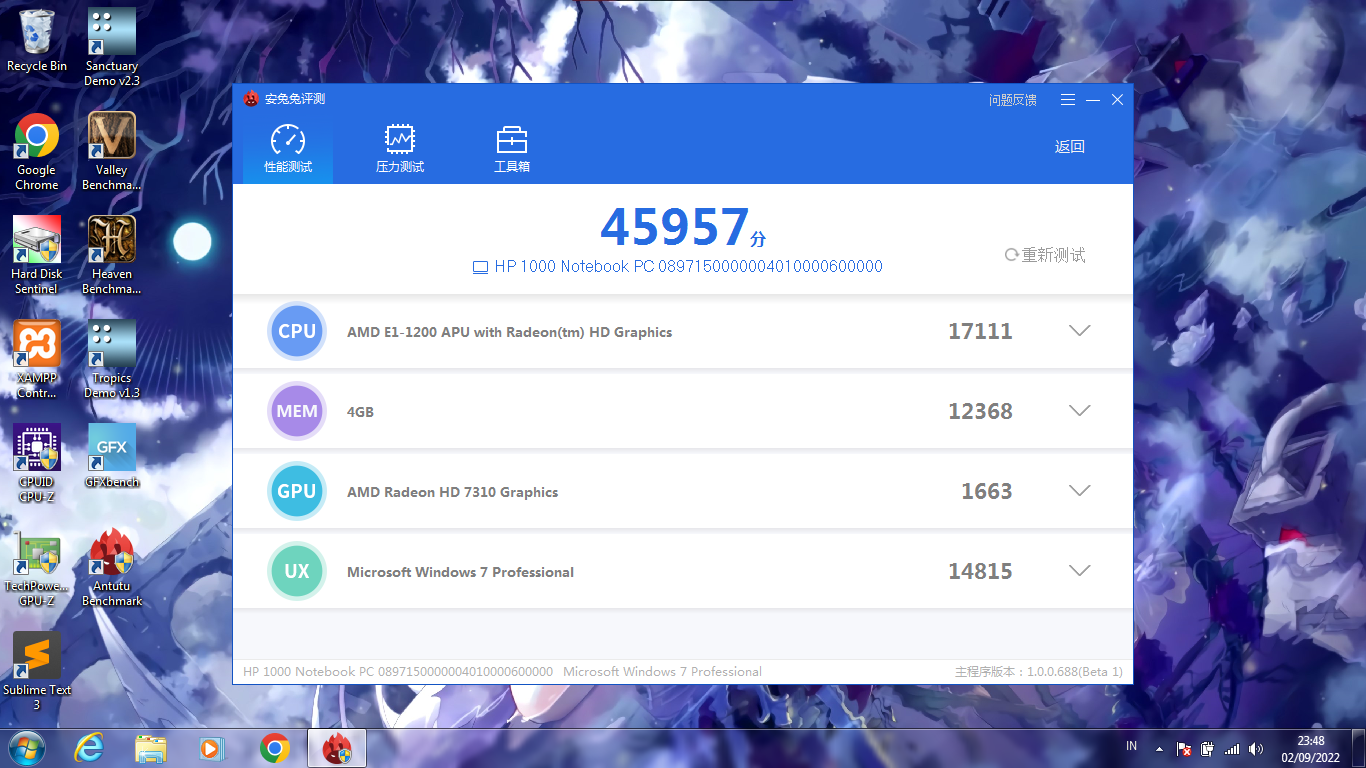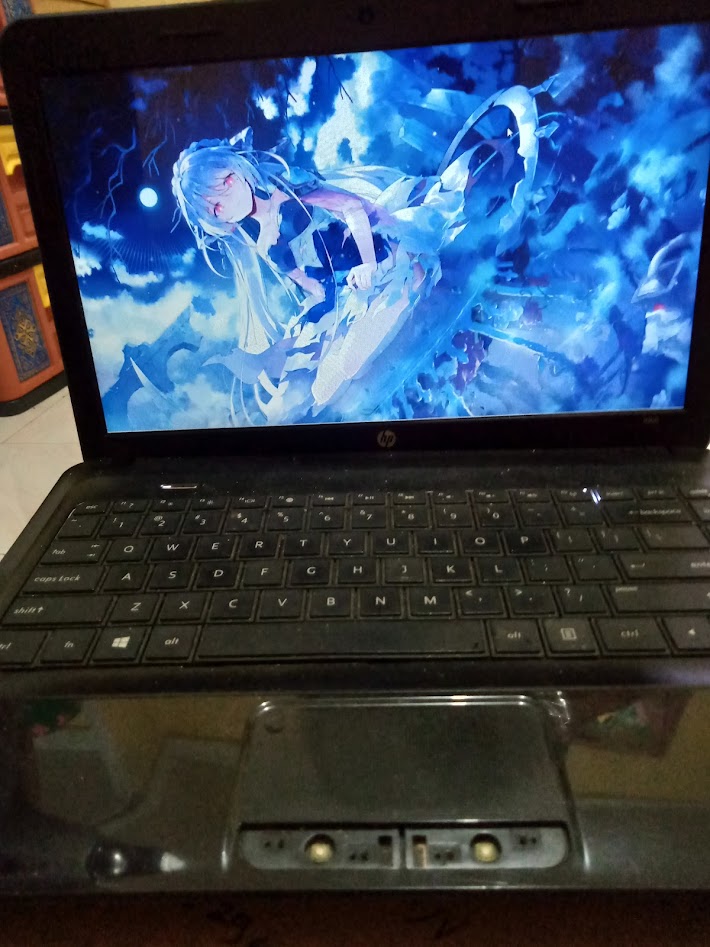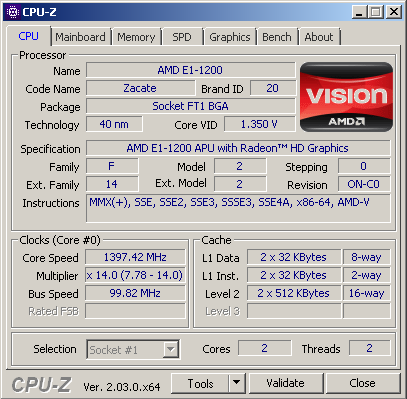AnTuTu Benchmark (BETA) - CPU score 17111 points with a E1-1200
Thursday, 01 January 1970 07:00 | Update at null
Media Gallery
Screenshot

Device, Setup, etc



URL
https://bit.ly/3QpsbprInformation Detail
Hardware: AMD E1-1200
Specs:CPUID : AMD E1-1200 APU with Radeon(TM) HD Graphics
Architecture : x86
Codename : Zacate
L3 Cache : -
Clock : 1.4GHz
Core/Thread : 2/2
TDP : 18W
Technology : 40nm
Socket : FT1 BGA 413-Ball
IGPU : AMD Radeon HD 7310
See more specification...
Software: AnTuTu Benchmark (BETA) - CPU
Score: 17111 points
About: AnTuTu Benchmark (BETA) - CPUAnTuTu Benchmark (BETA) for Windows is the desktop version of one of the world's most popular benchmark apps, commonly known as a performance measurement tool on Android devices. In this Windows version, AnTuTu presents a similar approach to evaluating hardware performance, specifically the CPU (Central Processing Unit), on computers based on the Windows operating system. Although still in beta, the app still provides fairly accurate performance information, especially for users who want to compare processor performance across different platforms.
Tests on the CPU include various computing scenarios designed to assess the CPU's processing speed, multitasking efficiency, and ability to handle complex algorithms. This benchmark measures the performance of processor cores in performing common tasks, such as encryption, data compression, image processing, and logic simulations and numerical calculations. The final score of the AnTuTu CPU Benchmark reflects the processor's ability to handle real-world workloads, making it an important reference in selecting or evaluating a system.
One of the advantages of the Windows version of AnTuTu is its modern and interactive interface, making it easy for users to visually understand the benchmark results. CPU scores are separated from GPU, memory, and storage scores, so users can clearly see which parts of the system are its strengths or weaknesses. This is very useful for general users, gamers, or even professionals looking for the best CPU performance for productivity and entertainment needs.
Although originally known as a mobile benchmark, AnTuTu's presence on the Windows platform opens up new opportunities to compare performance across devices-from smartphones to desktops. As such, this benchmark not only helps individual users, but also becomes a useful tool for reviewers, software developers, and tech enthusiasts who want to evaluate system performance quickly and easily.
Released in 2012 as part of the Brazos 2.0 family, the AMD E1-1200 is a power-efficient processor aimed at entry-level laptops. It has a 2 core and 2 thread configuration with a fixed clock speed of 1.4 GHz, with no support for Turbo Core technology. Built with a 40nm fabrication process, the E1-1200 has a TDP value of 18 watts-efficient enough for portable devices that emphasize low power consumption and longer battery life. Despite its limited performance, the E1-1200 was a popular choice in its day thanks to its affordable price and ability to handle light computing needs.
One of the main advantages of the AMD E1-1200 is the integrated Radeon HD 7310 GPU, which offers better graphics performance than Intel's entry-level graphics solutions at the time. This GPU has the ability to play HD resolution videos smoothly, as well as run light games such as Counter Strike 1.6, Plants vs Zombies, or other casual games with minimum graphics settings. That said, this combination of CPU and GPU is not intended for heavy-duty work such as video editing, 3D rendering, or modern gaming. Overall performance is more optimal when used for tasks such as browsing, streaming videos, accessing social media, typing documents, as well as basic office applications.
However, it should be noted that the AMD E1-1200 is less suitable for heavy multitasking, especially in modern operating systems like Windows 10. With a low clock speed and no Boost feature, users may experience lag or limitations when opening multiple applications at once. In tests using the HP 1000 1b05au laptop, this processor was paired with 4GB DDR3 single channel RAM (2 DIMM slots) and tested on Windows 7, Windows 8, and Windows 10 operating systems. The results show that the most optimal performance is achieved on Windows 7 or Windows 8, while in Windows 10 the system tends to be slow although it can still be used for basic needs. As such, the AMD E1-1200 can still be relied upon as a power-efficient and inexpensive solution for users with very light computing needs.
Hardware Detail:
Device: HP 1000 1b05au
RAM: 4GB DDR3 Single Channel 2 DIMM
OS: Windows 7, Windows 8, Windows 10
* Not Avaiable
